|
|
|
Sort Order |
|
|
|
Items / Page
|
|
|
|
|
|
|
| Srl | Item |
| 1 |
ID:
119838
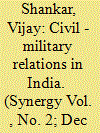

|
|
|
| 2 |
ID:
085950
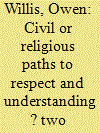

|
|
|
|
|
| Publication |
2009.
|
| Summary/Abstract |
While trends towards secularization may have appeared inexorable as the last century came to a close, more recent events, particularly in the aftermath of 9/11, have led to greater attention being paid to the resurgence of religion globally. But how to represent and portray religion, with respect and understanding, in this new environment may contain significant challenge-a subject which this paper considers in the light of two recent Commonwealth Reports. The Report of the Commonwealth Commission on Respect and Understanding, entitled Civil Paths to Peace, chaired by Amartya Sen, and presented recently to the Commonwealth Heads of Government summit in Kampala, Uganda, seeks to downplay any single-minded concentration on religion in favour of promoting broader civil engagements in crafting civil paths to peace. In contrast, the Commonwealth Foundation's Report, Engaging with Faith, treats religion more sympathetically and encourages understanding and cooperation between the faith communities. The former Report may tend to treat religion as part of the problem, while the latter might view religion as part of the solution. Thus, the two Reports illustrate contrasting and conflicting views as to the place of religion in efforts to promote global peace and development along the path to respect and understanding.
|
|
|
|
|
|
|
|
|
|
|
|
|
|
|
|
| 3 |
ID:
106651
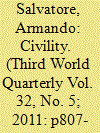

|
|
|
|
|
| Publication |
2011.
|
| Summary/Abstract |
This study explores the question of if and how associative bonds based on violence, control and self-restraint mediated by contractual relationships become institutionalised within societies and discusses the cultural factors that determine this threshold. It investigates the trade-off between formalised forms of interaction that safeguard individual rights and secure state control, and less formal modes of civility that deepen trans-state interconnectedness. It asks whether civility is the result of a global civilising process in the sense highlighted by Norbert Elias, whereby affect control is matched by formal norms guaranteed by legitimate institutions, or whether it is rather the much more complex constellation of specific actualisations of the more general trade-off as just defined. After summarising the current twists of the meaning of civility against the background of liberal and modernist precedents and delineating the alternative patterns of civility within Islamic, especially modern Ottoman, history, the analysis critically interrogates Weber's notion of Verbrüderung as the pre-modern root concept of organised forms of common action, mutual solidarity and civic participation. Finally, it questions whether this idea fits the historic forms of association in the Islamic world, in particular the privileging of a lower threshold of institutionalisation of the associational bond than has traditionally been found in the European experience-and which survives in the current anxieties about resurgent mahalle (neighbourhood) informal governance in the AKP's Turkey.
|
|
|
|
|
|
|
|
|
|
|
|
|
|
|
|
| 4 |
ID:
119845
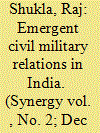

|
|
|
| 5 |
ID:
119850
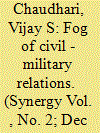

|
|
|
| 6 |
ID:
119837
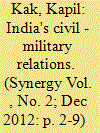

|
|
|
| 7 |
ID:
088075
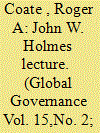

|
|
|
|
|
| Publication |
2009.
|
| Summary/Abstract |
Three decades ago John Holmes argued that the need for having the kind
of "international organizations in which to tackle the inescapably complex
economic and social issues in an interdependent world need not be
restated." Despite these words, ten years later, when Donald Puchala and I presented
the first "State of the United Nations Report" to the second annual meeting
of the Academic Council on the United Nations System (ACUNS), we found
an organizational system teetering and tottering on the verge of crisis.1 There
was a void of leadership, as well as a crisis of capacity precipitated largely by
the refusal of the United States to fulfill its legal obligation to fund UN agencies;
and staff morale was at a historic low. One of the main themes that we explored
in that report was the challenge to the UN system-as intergovernmental institutions-
of dealing with the plethora of global problems that confront the world
and dominate the global agenda and that cannot be solved by governmental or
intergovernmental means alone. Now, after twenty more years, the illusive quest
continues for new avenues and directions for making global governance more
effective for promoting sustainable human security and development.
|
|
|
|
|
|
|
|
|
|
|
|
|
|
|
|
| 8 |
ID:
139801
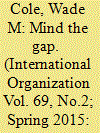

|
|
|
|
|
| Summary/Abstract |
According to recent studies, international human rights treaties are ineffective, counterproductive, or else beneficial for only those countries that tend to respect human rights regardless of treaty membership. Analysts often attribute gaps between human rights principles and practices to willful disobedience, self-interested defection, and ineffective enforcement. Using two-stage regression models to analyze compliance with the International Covenant on Civil and Political Rights, I examine whether countries' inability (as opposed to unwillingness) to implement treaty terms is also responsible for the gap between commitment and compliance. I find that one dimension of state capacity in particular—bureaucratic efficacy—enhances levels of compliance with civil, political, and physical integrity rights provisions. These findings lend credence to an important aspect of the managerial approach—that noncompliance is often inadvertent and conditioned by a state's ability to implement treaty terms.
|
|
|
|
|
|
|
|
|
|
|
|
|
|
|
|
| 9 |
ID:
145959
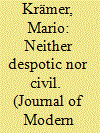

|
|
|
|
|
| Summary/Abstract |
Are South African chiefs rural and peri-urban despots or have they transformed to legitimate representatives of local interests in the post-apartheid era? This article argues that the legitimacy of chieftaincy in KwaZulu-Natal is not only based on constitutional and legal recognition, but that chieftaincy may rely on different forms of ‘basic legitimacy’. Chieftaincy is neither despotic nor civil but occupies an intermediary position between local citizens and the state. This junction position provides chiefs with specific opportunities to gain power but also requires a navigation between cooperation and conflict in the relationship with the ANC and the state.
|
|
|
|
|
|
|
|
|
|
|
|
|
|
|
|
| 10 |
ID:
084476
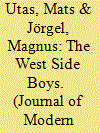

|
|
|
|
|
| Publication |
2008.
|
| Summary/Abstract |
The West Side Boys were one of several military actors in the Sierra Leonean civil war (1991-2002). A splinter group of the army, the WSB emerged as a key player in 1999-2000. In most Western media accounts, the WSB appeared as nothing more than renegade, anarchistic bandits, devoid of any trace of long-term goals. By contrast, this article aims to explain how the WSB used well-devised military techniques in the field; how their history and military training within the Sierra Leone army shaped their notion of themselves and their view of what they were trying to accomplish; and, finally, how military commanders and politicians employed the WSB as a tactical instrument in a larger map of military and political strategies. It is in the politics of a military economy that this article is grounded
|
|
|
|
|
|
|
|
|
|
|
|
|
|
|
|
|
|
|
|
|